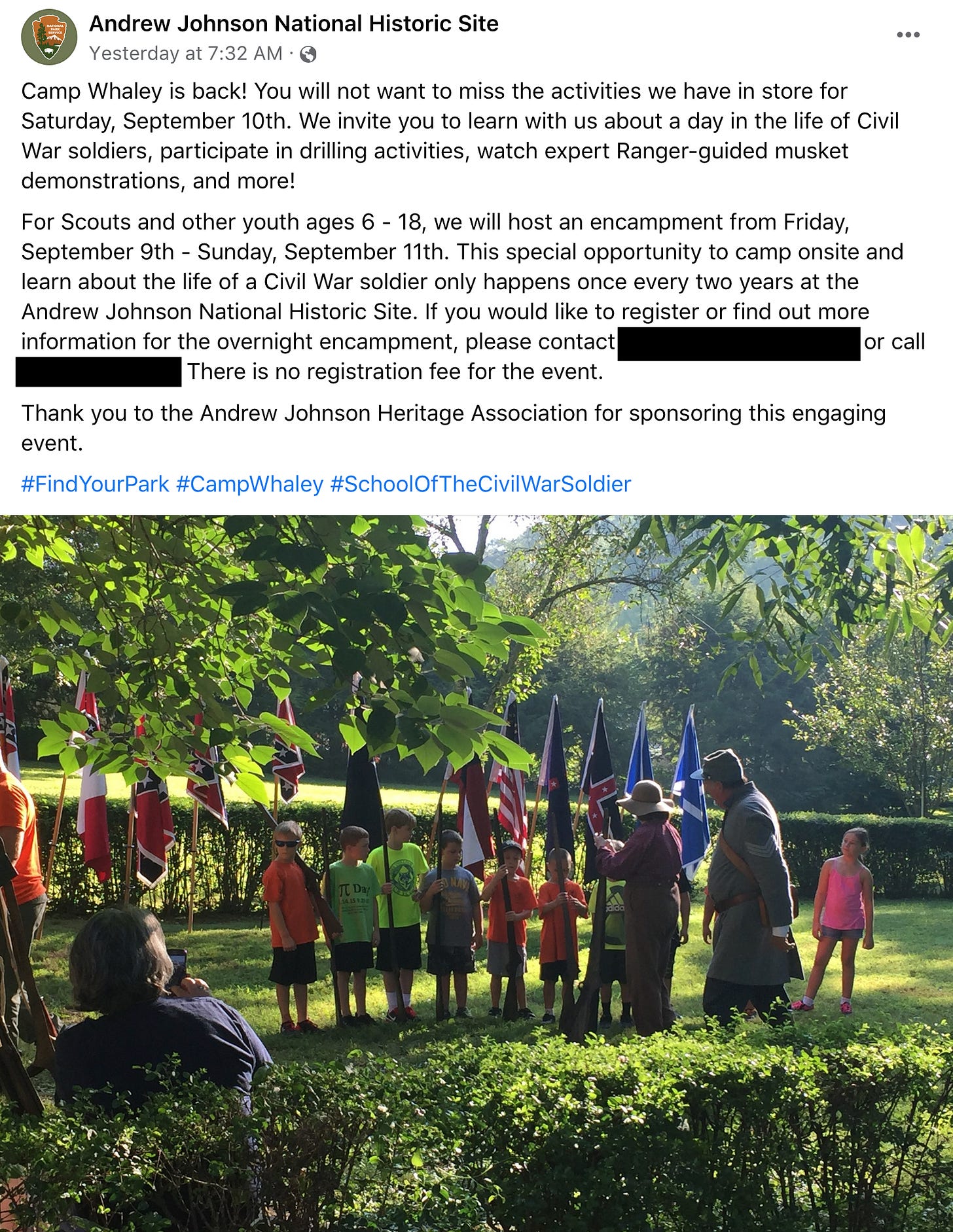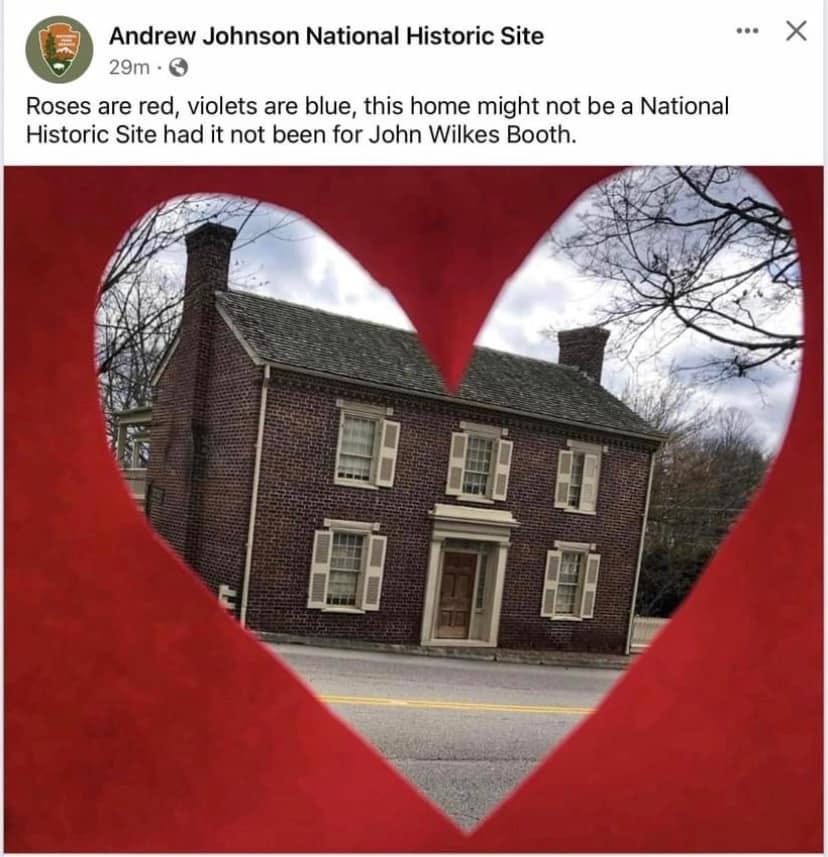Update: The NPS staff at Andrew Johnson National Historic Site removed the post in question and issued the following announcement:
Earlier, the Andrew Johnson National Historic Site published a post advertising the 2022 Camp Whaley event. The site used a photograph of a past camp event which, though not intended, provoked responses that have caused park staff to review the event as a whole.
It is the position of Andrew Johnson NHS to ensure that, when engaging visitors in person or on social media, the complete story of the history related to the site and the period of time involved is told.
To that end, park staff have decided to postpone the 2022 Camp Whaley event in favor of evaluating public concerns and working with our partners to plan a more comprehensive future event that takes into consideration the multiple viewpoints expressed.
I am not surprised that they decided to review this program. It is a testament to the professionalism of the NPS that I have come to know and respect.
Anyone who has followed this blog over the years knows that I am a huge fan of the National Park Service. They are entrusted with protecting and interpreting some of this country’s most important historic sites and they do an incredible job under difficult conditions.
A good friend of mine, who is employed by the National Park Service, shared the following Facebook post from the Andrew Johnson National Historic Site, located in Greeneville, Tennessee. I was immediately taken aback by the photograph used to publicize an upcoming program for children on the life of the Civil War soldier.
This is a wonderful example of how not to use social media at a historic site, especially one operated by the National Park Service.
On the face of it, there is nothing wrong with a program about the life of the Civil War soldier and I certainly don’t want to assume anything about what the NPS and/or third party has planned for this event based solely on a photograph from a previous event.
That said, there are a number of things that concern me.
First and foremost, I don’t believe that the NPS should distribute toy guns to a group of children. I understand that it might be helpful in teaching them how Civil War soldiers marched, formed for battle, and attacked, but in my mind it is highly inappropriate given recent incidents of gun violence and the massacre of children in Uvalde, Texas.
There are other ways to teach children this specific aspect of soldiering.
But it’s not just the arming of kids with toy rifles that concerns me, I also believe that the NPS needs to be extremely careful about the display of the Confederate battle flag in its social media posts announcing these events and especially on site.
Again, I am willing to assume that any use of the Confederate flag at a public event like this is intended solely for historical purposes. But regardless of intent, it is now impossible to divorce this flag from the racial massacre of nine churchgoers in Charleston in 2015, the “Unite the Right” rally in Charlottesville in 2017, and its connection to the long history of racism and white supremacy in the United States.
As a marketing tool the choice of photograph is incredibly insensitive. Does the staff at Andrew Johnson National Historic Site have any interest in attracting African-American children to this program? It’s always dangerous to engage in essentialist thinking about what various groups of people believe about any given subject, but I suspect that few, if any, Black families would conclude, based on the photograph, that this is an appropriate program for their child.
It’s not a stretch to imagine that some people might not even feel welcome at such an event.
There is also something painfully ironic about an event that includes Confederate flags taking place at the home of Andrew Johnson. Say what you will about his Reconstruction policies and his commitment to blocking any advances in Black civil rights, Johnson at least remained loyal to the United States and committed to defeating the Confederacy.
I received this response to my concerns on their Facebook page:
Thank you for your concerns. We agree that this is a very difficult time period in our nation’s history. The site holds events like this one to tell the hard stories, to not forget the struggles of the reconstruction era, and to understand how we are still coping with many of them today.
Through interpretation and immersion we hope to engage stewardship, heighten empathy, and evolve to be a better, more cohesive nation for all.
I have no doubt that the response is sincere, which is one of the reasons why I am highlighting this particular Facebook post, but this is not the first time that the Andrew Johnson National Historic Site has come under criticism for its public programming and social media engagement.
Do better.






Their response seems like a non-response response. Corporate speak, in other words
Having worked closely with NPS at the Little Bighorn Battlefield National Monument, it seems to me there has to be more to the story than what is clearly bad taste (the Valentine’s Day post with JWB was at the very least, a bit odd). In my experience as a former President of a Friends group which supported the NPS at Little Bighorn, there is typically a lot of red tape and bureaucracy involved with approving events on NPS sites, so it strikes me that there seems to be a lack of compliance perhaps due to inadequate supervision or unenforced regulations. But some parks may still be very “mom & pop” oriented when it comes to reenactors or living historians, and perhaps give them too much latitude without considering public relations (let alone the global reach of social media).